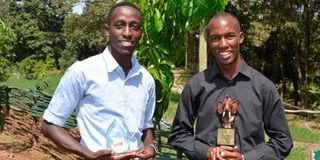Innovative Egerton varsity's Joseph Nguthiru, Charles Rugendo win Sh1.65m

Charles Rugendo and Joseph Nguthiru, who are fifth year students at Egerton University, display some of the past awards they have won for their innovative ideas.
Two students from Egerton University have won a Sh1.65 million award after emerging top in the third edition of the TotalEnergies Startup of the Year Challenge.
Joseph Nguthiru, 24, and his colleague Charles Rugendo, 25, won the award for their patented business concept, Hyapak, that converts water hyacinth into biodegradable alternatives to single-use plastic products. Hyapak beat 1,012 entries to emerge top in the Best Business Creation Project.
Nguthiru and Rugendo are now set to represent TotalEnergies Kenya in the TotalEnergies Africa finals where they are hoping to triumph and represent the continent in the global competition in France later this year.
"The award has a great social impact and we thank TotalEnergies for their technical support. It is a mark of appreciation. It means a lot to the environment. It means as a youth, we can make a change that can reflect in the world," said Nguthiru.
They plan to use the prize money to conduct enhanced research on Hyapak.TotalEnergies managing director Eric Fanchini said the company was committed to support young innovators develop their ideas to full potential.
Local entrepreneurs
"TotalEnergies will reward young local entrepreneurs aged between 18 and 35 for their business creation project or a start-up that is under three years old, regardless of the sector of activity," said Mr Fanchini.
Before bagging the cash prize from TotalEnergies, the duo won the East Africa Youth for Climate Action Award by Intergovernmental Authority on Development (IGAD) and emerged second runners-up in the World Engineering Day hackathon earlier this year.
Rugendo, who is specialising in water engineering, said he was inspired to study engineering by his love for innovation. "I have a passion for developing something new."
He said their project aims at solving the plastic pollution problem, particularly around major water bodies and the water hyacinth menace.
"The main focus is offering sustainable solutions to the problem of water hyacinth and plastic pollution," said Nguthiru, who chose to study engineering so as to find solutions to communal problems.
"I enjoy researching problems and exploring new technologies. Engineering has allowed me to meet new friends who are also interested in science and technology."
Nguthiru, who is an alumni of Alliance High School, said the idea for project was born in June last year when they got stuck in Lake Naivasha during a class trip.
"Our boat got stuck in the water hyacinth for close to five hours and that's what prompted the idea behind Hyapak.”
Rugendo adds: "We thought about converting our project into a more sustainable idea. The data we have collected in the past six months indicate that tree seedlings planted with hyacinth wrapper are growing faster."
Despite their winning streak, Hyapak has not been a walk in the park for the innovative duo. They have been forced to make do with a shoestring budget and inefficient laboratory equipment at the university.
"We spent a lot of time and resources commuting to Lake Naivasha to get the supplies we needed for the project,” explained Nguthiru. The silver lining however is that they are the first researchers to come up with a workable solution to deal with the water hyacinth menace in Kenya and the globe at large.
"We have never heard of anyone who has created a single biodegradable seedling wrapper. This is our original idea," said Rugendo.
In 2018, Nguthiru made a local pyrethrum drier that helps local farmers dry their produce. The project was a collaboration between Egerton University, Pyrethrum Processing Company of Kenya (PPCK), the American based company Kentegra and Tinroof Foundation.
"It remains one of my most glorious moments as an engineering student as the drier is used by smallholder farmers," he said.
In 2019, during the International Engineering Conference, the duo presented a project on smart road project which came third overall. The following year, they did a project on smart pipes which use less energy when pumping water, detects illegal connections, leakages and reduces water rationing through intelligent water distribution.
"We could not implement the project because of lack of finances. If implemented, the project could reduce the rampant water losses in Kenya," said Nguthiru.
In 2020 the duo and another colleague, Pascal Nabiswa, won first place in a competition sponsored by a cosmetic company which wanted to reduce the usage of plastic packaging material for their products.
They have developed valuable career skills as interns including how to relate with people, teamwork, discipline and commitment, and networking.
"My confidence in putting ideas forward has grown. I have seen how ideas have a tangible effect at work. I have learned to be a team leader," said Rugendo
Nguthiru says: "My marketing, negotiation, supply chain management, finance skills and how businesses work with the government have improved. These are skills that you're never taught in an engineering class."
The cabinet secretary for ICT, Joe Mucheru, praised the two for their win and urged the youth to fully embrace innovation.
"Kenya is renowned as the Silicon of the Savanna. With more innovations, we will create more opportunities for growth for Kenya and Africa," said Mr Mucheru.
The students said engineering companies should partner with universities to help young start-ups reap from their ideas.





